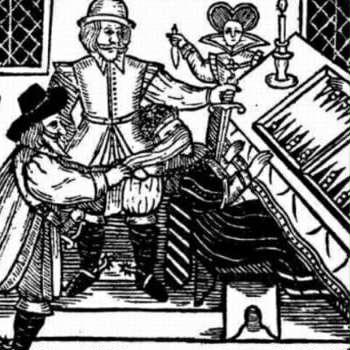
d: 1551
Alice Arden
Summary
Name:
Years Active:
1551Status:
ExecutedClass:
MurdererVictims:
1Method:
StabbingDeath:
March 14, 1551Nationality:
England
d: 1551
Alice Arden
Summary: Murderer
Name:
Alice ArdenStatus:
ExecutedVictims:
1Method:
StabbingNationality:
EnglandDeath:
March 14, 1551Years Active:
1551bio
Alice Brigandine was born around 1516 into a relatively privileged English family. Her father, John Brigandine, held a respectable position, and her stepfather, Sir Edward North, would later become the 1st Baron North. Despite this elevated social standing, Alice’s personal life would later take a darker turn.
She married Thomas Arden of Faversham, Kent, although the exact date of their union is unknown. Together, they resided in Faversham Abbey, a former monastic property that had been dissolved during the English Reformation in 1536. They had at least one daughter, Margaret Arden, born in 1538. Though married into gentility, Alice grew increasingly dissatisfied with her marriage and sought romantic companionship outside of it.
Alice began a flagrant and scandalous affair with Richard Mosbye, a tailor by trade and a man of lower social standing who had once been in the employ of Edward North. Their relationship was no secret; Mosbye regularly visited the Arden household and was familiar to the family. Despite the public nature of their affair, Thomas Arden reportedly turned a blind eye, perhaps unwilling to disrupt ties with Alice’s powerful family.
Over time, Alice’s disdain for her husband deepened. She first attempted to poison him by lacing his milk with toxins, but the taste exposed her plan. Failing in this quiet attempt, she turned to more direct and ultimately fatal means.
murder story
After the failed poisoning, Alice and Mosbye began plotting Thomas Arden’s murder with the help of several accomplices. The conspiracy would eventually involve a network of individuals, each motivated by personal grievance, money, or loyalty to Alice and Mosbye.
Their key accomplice was John Green, a local tailor who held a longstanding grudge against Thomas over a land dispute. Green, in turn, recruited George Bradshaw, a former soldier, and Black Will, a notorious ex-mercenary and highwayman with a violent past. Will would eventually become the designated assassin.
The group made several attempts to ambush Thomas, including during walks in London and along roads near Faversham. Each time, either circumstance or miscalculation prevented the murder. Alice then turned to her home as the final location for the crime.
On the night of Valentine’s Day, Alice and her co-conspirators executed their plan. The chosen setting was the parlour of the Arden home. Richard Mosbye was already present, playing a game of backgammon with Thomas to occupy him. Black Will was concealed in a nearby closet, ready to strike.
At a pre-arranged signal, Will emerged and strangled Thomas with a towel while Mosbye bludgeoned him with a heavy pressing iron. The assault left Thomas unconscious but not yet dead. He was then moved to his counting house, where Will finished the job by slitting his throat and robbing his corpse.
Alice, ensuring the murder was completed, stabbed her husband’s body seven or eight times. The conspirators quickly cleaned the crime scene. Bloodied items—including the knife and cloth—were poorly hidden nearby.
That same night, Alice hosted guests for a delayed supper to establish an alibi. The group played music and danced, intending to create the impression that Thomas was still alive and entertaining guests. After the festivities, Alice, her daughter Margaret, the maid Elizabeth Stafford, and Mosbye’s sister Cicely Pounder moved the body to a field behind the house, near a churchyard gate Thomas used regularly. Their hope was to make the death appear as an attack outside the home.
By the next morning, Alice raised an alarm, claiming her husband had gone missing. Local townspeople organized a search and soon found Thomas’s body in the nearby field. The circumstances immediately aroused suspicion. The corpse was dressed only in nightclothes and slippers, an unusual choice for someone allegedly out on business. More damningly, snow on the ground preserved footprints leading directly from the Arden home to the site where the body was dumped.
Under pressure from authorities and community scrutiny, Alice eventually confessed to the crime. She named all her accomplices, many of whom were promptly arrested. Mosbye was found asleep at a local inn, with blood on his clothing. Bradshaw, though tangential to the murder itself, was implicated through letters and association. Black Will initially escaped arrest but was later captured and executed.